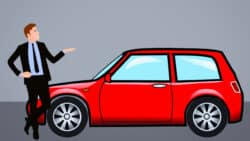Picture this: you’re cruising down the highway at a comfortable speed when suddenly, you need to hit the brakes to slow down or come to a stop. However, instead of a smooth and controlled deceleration, you feel your car shaking and vibrating as you apply the brakes, especially at higher speeds. This unsettling experience can be a cause for concern, but understanding the reasons behind it and knowing how to address the issue is essential for your safety and peace of mind.
Reasons Why My Car Shakes While Braking at High Speeds
Several factors can contribute to your car shaking while braking at high speeds. Here are some of the most common culprits:
- Brake Rotor Warping:
Brake rotors (or discs) can warp over time due to heat generated during braking. When they become uneven, they can cause vibrations and shaking when the brake pads make contact.
- Uneven Brake Pad Wear:
Uneven wear on your brake pads can lead to inconsistent contact with the brake rotor, resulting in vibrations and shaking while braking.
- Suspension Issues:
Faulty or worn-out suspension components, such as struts, shocks, or control arms, can impact your car’s stability during braking, especially at high speeds.
- Wheel and Tire Imbalance:
Unbalanced wheels or tires can cause your car to shake, and this sensation may become more pronounced when you apply the brakes at high speeds.
- Loose or Worn Steering Components:
Issues with your vehicle’s steering components, such as tie rods or ball joints, can affect wheel alignment and contribute to shaking during braking.
- Brake Caliper Problems:
Sticking or malfunctioning brake calipers can cause uneven brake pad pressure on the rotor, resulting in shaking when you brake.
Addressing the Issue: Solutions and Recommendations
If you experience your car shaking when braking at high speeds, it’s essential to address the problem promptly to ensure your safety and prevent further damage to your vehicle. Here are the steps you can take:
- Have Your Brakes Inspected:
Schedule a brake inspection with a certified mechanic. They can assess the condition of your brake rotors, pads, and calipers to determine if any components need replacement or resurfacing.
- Check Wheel and Tire Balance:
If you suspect wheel or tire imbalance, have your wheels balanced and aligned. Properly balanced wheels and aligned tires can improve stability and reduce shaking.
- Suspension Inspection:
Inspect your vehicle’s suspension components for signs of wear or damage. If issues are detected, have them repaired or replaced by a qualified mechanic.
- Steering System Check:
Ensure that your steering system is in good condition by having it inspected for loose or worn components. Any necessary repairs should be carried out promptly.
- Maintain Regular Brake Service:
To prevent issues like rotor warping and uneven brake pad wear, follow a regular brake maintenance schedule recommended by your vehicle’s manufacturer.
READ ALSO: Expert Guide On Using Yamaha Motorcycle VIN Decoder
Safety First: Addressing the Shaking While Braking
Experiencing vibration while braking at high speeds can be unnerving, but it’s essential not to ignore it. Ignoring the issue can lead to further damage, compromised safety, and more costly repairs down the road. By promptly identifying the underlying cause and taking appropriate measures, you can restore your car’s smooth and safe braking performance, ensuring a secure driving experience at any speed.
Brakes Vibrating at High Speed
Experiencing your brakes vibrating at high speeds can be a disconcerting sensation. This phenomenon is often linked to issues with your vehicle’s braking system, specifically the brake rotors.
Over time, brake rotors can develop irregularities due to the immense heat generated during braking. These irregularities, known as warping, can cause your brake pedal, steering wheel, and even the entire vehicle to shake when you apply the brakes at higher speeds.
Brake rotor warping can lead to uneven contact between the brake pads and the rotor’s surface, resulting in an unsettling vibration.

Shaking While Braking at High Speeds
Shaking while braking at high speeds is a problem that should never be ignored. It can result from various factors, including worn-out or unevenly worn brake pads, damaged suspension components, or wheel and tire imbalances.
The shaking sensation typically intensifies as you apply the brakes more forcefully, making it crucial to address the issue promptly. Ignoring this problem can not only compromise your safety but may also lead to more extensive and costly repairs in the long run.
Vibration While Braking at High Speeds
Experiencing vibration while braking at high speeds is a clear indicator that something is amiss within your vehicle’s braking or suspension system. This vibration can range from subtle to severe, depending on the underlying issue. The most common culprits are brake-related, such as warped rotors or unevenly worn brake pads.
However, it’s essential to consider other factors, including the state of your tires, wheel balance, and overall suspension health, as they can all contribute to the sensation of vibration while braking at high speeds.
Steering Wheel Shaking While Braking at High Speed
When your steering wheel shakes while braking at high speed, it’s often a sign of brake-related issues, particularly with the front brakes. The uneven contact between the brake pads and rotors due to warping or wear can transfer vibrations directly to the steering wheel. Addressing this problem is crucial not only for your comfort but also for your safety, as it ensures that your vehicle maintains stable and controlled braking performance, even at higher speeds.
READ ALSO: Peterbilt VIN Number Lookup: How Does It Work? What Information You Will Get?
Frequently Asked Questions
1. Why do my brakes start vibrating at high speeds?
Brake vibration at high speeds can be caused by various factors, such as warped brake rotors, uneven brake pad wear, or wheel alignment issues. It’s essential to diagnose the exact cause to address the problem.
2. What are the common signs of brakes shaking at high speeds?
Common signs include a pulsating brake pedal, shaking in the steering wheel, and a vibrating sensation in the vehicle when applying the brakes at high speeds.
3. Is it safe to continue driving when my brakes are shaking while braking at high speeds?
It’s not recommended to continue driving if you experience brake shaking at high speeds. This issue can compromise braking performance and safety. Have your brakes inspected and repaired as soon as possible.
4. How can I determine if the vibration while braking at high speeds is due to the front or rear brakes?
A professional mechanic can diagnose the issue by inspecting the entire braking system. However, if you notice the vibration primarily in the steering wheel, it’s more likely a front brake issue, whereas rear brake problems may result in vibrations felt throughout the vehicle.
5. What should I do if my steering wheel is shaking while braking at high speed?
If your steering wheel shakes while braking at high speeds, it’s a strong indication of brake-related issues. Schedule an appointment with a qualified mechanic to inspect and repair your brakes promptly.
Remember that addressing brake issues promptly is crucial for your safety and the longevity of your vehicle. If you experience any of these symptoms, it’s best to consult a professional mechanic for a proper diagnosis and necessary repairs.







